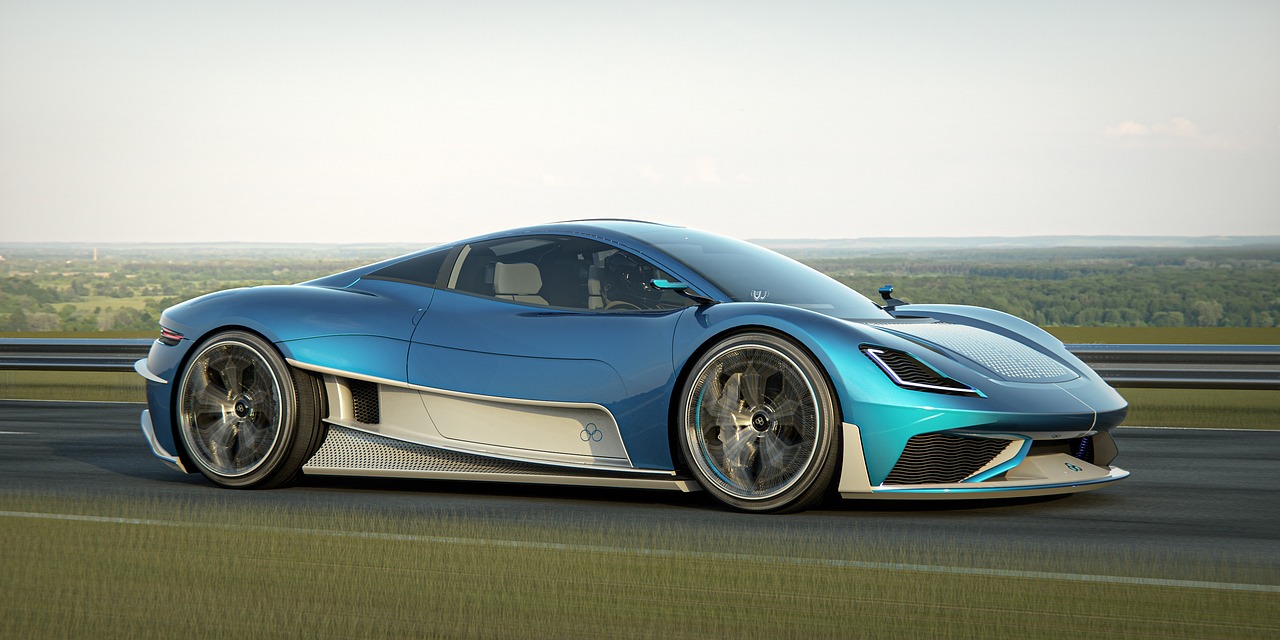Benefits of Driving Electric Cars
In today's fast-paced world, the shift towards electric vehicles (EVs) is more than just a trend; it's a revolution. Imagine gliding through the streets in a car that not only saves you money but also contributes to a cleaner planet. The are plentiful, and they go beyond mere convenience. As we dive into this topic, you'll discover how EVs are changing the landscape of transportation, making them an appealing choice for modern drivers.
One of the most compelling reasons to consider an electric vehicle is their environmental impact. Electric cars significantly reduce greenhouse gas emissions and air pollutants. Unlike traditional gasoline vehicles, EVs produce zero tailpipe emissions, which means cleaner air for everyone. Think about it: every time you drive an electric car, you’re not just reducing your carbon footprint; you're actively participating in the fight against climate change. This shift is crucial, especially in urban areas where air quality is often compromised. By choosing an electric vehicle, you’re promoting sustainability and helping to create a healthier environment for future generations.
Now, let’s talk money. Owning an electric vehicle can lead to substantial cost savings over time. While the initial purchase price of an EV might be higher than that of a traditional car, the long-term savings can be significant. Here’s a breakdown of how you can save:
- Lower Fuel Costs: Charging your EV is generally cheaper than filling up with gasoline. In fact, many EV owners report saving hundreds of dollars a year on fuel costs alone.
- Reduced Maintenance: Electric cars have fewer moving parts, which means less wear and tear. Say goodbye to frequent oil changes and complex engine repairs.
- Government Incentives: Various governments offer tax credits, rebates, and incentives for purchasing electric vehicles, making them even more affordable.
When it comes to fuel efficiency, electric cars are the clear winners. They convert energy more efficiently than traditional gasoline vehicles, resulting in lower energy costs per mile traveled. This makes them an economical choice for daily commuting. Imagine driving your car without constantly worrying about rising gas prices—what a relief!
Charging an electric vehicle at home is generally cheaper than refueling with gasoline. Depending on your local electricity rates, many owners find that they save significantly on energy costs over the life of the vehicle. Plus, with the convenience of charging at home, you can say goodbye to those pesky trips to the gas station!
To sweeten the deal, various governments around the world are stepping up to make electric vehicles more accessible. From tax credits to rebates, these incentives can significantly lower the overall cost of ownership. It’s like getting paid to help the planet—now that’s a win-win!
Another appealing aspect of electric cars is their maintenance requirements. With fewer moving parts compared to internal combustion engines, EVs demand less maintenance. This translates to lower long-term ownership costs and fewer trips to the mechanic. Imagine having more time and money to spend on things you love rather than worrying about car repairs!
Let’s not forget about the fun factor! Electric vehicles often boast impressive performance metrics, including quick acceleration and advanced technology features. Driving an EV is not just about efficiency; it’s about enjoying the ride. Many electric cars provide instant torque, leading to rapid acceleration and a thrilling driving experience. If you’ve ever been in an electric car, you know that the rush of speed can be exhilarating!
With the ability to go from 0 to 60 mph in mere seconds, electric cars redefine what it means to drive. This performance capability is a significant draw for many consumers, making the switch to electric not only a responsible choice but also an exciting one. Who wouldn’t want to feel the rush of instant power at their fingertips?
Modern electric vehicles come equipped with innovative technology that enhances the overall driving experience. From advanced infotainment systems to autonomous driving features, the tech in EVs is designed to make your life easier and more enjoyable. Imagine having a car that not only gets you from point A to B but also keeps you entertained and connected along the way.
Q: Are electric cars really better for the environment?
A: Yes! Electric cars produce zero tailpipe emissions, significantly reducing air pollution and greenhouse gases.
Q: How much can I save on fuel with an electric vehicle?
A: Many EV owners report saving hundreds of dollars a year on fuel costs compared to traditional gasoline vehicles.
Q: What about maintenance costs for electric cars?
A: Electric vehicles have fewer moving parts, which typically results in lower maintenance needs and costs over time.
Q: Are there government incentives for buying electric vehicles?
A: Yes, many governments offer tax credits, rebates, and incentives to make electric vehicles more affordable.

Environmental Impact
When it comes to driving, the choices we make can have a profound effect on our planet. Electric vehicles (EVs) are at the forefront of the movement to create a cleaner, more sustainable future. By significantly reducing greenhouse gas emissions and air pollutants, EVs play a crucial role in combating climate change. Imagine a world where the air is fresher, and our cities are quieter—this is the promise that electric cars bring.
One of the most compelling aspects of electric cars is their ability to lower our carbon footprint. Traditional gasoline vehicles emit a staggering amount of carbon dioxide and other harmful gases, which contribute to global warming and air quality issues. In contrast, electric cars produce zero tailpipe emissions. This means that as more people make the switch to EVs, we can collectively reduce the amount of harmful pollutants released into the atmosphere. Just think about it: if every driver switched to an electric vehicle, how much cleaner would our air be?
Furthermore, the environmental benefits extend beyond just emissions. The production and use of electric cars also encourage the development of renewable energy sources. As the demand for electricity grows, so does the push for cleaner energy solutions like solar, wind, and hydroelectric power. This synergy between electric vehicles and renewable energy creates a positive feedback loop—more EVs lead to increased investment in sustainable energy, which in turn makes EVs even greener.
To illustrate the impact of electric vehicles on the environment, consider the following table comparing emissions from traditional vehicles versus electric vehicles:
| Type of Vehicle | CO2 Emissions (grams per km) | Air Pollutants (NOx, PM) |
|---|---|---|
| Gasoline Vehicle | 120-180 | High |
| Electric Vehicle | 0 | None |
As you can see, the contrast is striking. While traditional vehicles release a significant amount of CO2 and other harmful pollutants, electric vehicles contribute nothing to these emissions. This shift is vital for urban areas, where air quality can be a serious concern. Cities that embrace electric vehicles can expect to see a marked improvement in air quality, leading to healthier communities.
Moreover, the benefits of electric vehicles aren't just limited to emissions. They also contribute to noise reduction, which is often overlooked. Electric cars operate much more quietly than their gasoline counterparts, creating a more peaceful environment, especially in densely populated areas. Imagine driving through your neighborhood without the constant roar of engines—sounds pretty nice, right?
In conclusion, the of electric vehicles is profound and multifaceted. From reducing greenhouse gas emissions and air pollutants to promoting a shift towards renewable energy sources, the advantages are clear. By choosing to drive an electric vehicle, you're not just making a smart financial decision; you're also taking a stand for a cleaner, healthier planet. So, the next time you consider your transportation options, remember the bigger picture—your choice can help pave the way for a more sustainable future.
- Do electric cars really help reduce air pollution? Yes, electric cars produce zero tailpipe emissions, significantly improving air quality, especially in urban areas.
- Are electric vehicles more expensive than gasoline cars? While the upfront cost may be higher, electric vehicles often have lower operating costs, thanks to cheaper fueling and reduced maintenance.
- How do electric vehicles contribute to climate change mitigation? By reducing greenhouse gas emissions, electric vehicles help in the fight against climate change and promote sustainability.

Cost Savings
Owning an electric vehicle (EV) can lead to substantial savings over time, making them an increasingly attractive option for modern drivers. Imagine slashing your fuel costs while also enjoying lower maintenance expenses! With rising gas prices, the financial benefits of switching to an electric car are hard to ignore. In fact, studies have shown that EV owners can save thousands of dollars over the lifespan of their vehicles compared to traditional gasoline-powered cars. But how do these savings stack up?
One of the most significant factors contributing to cost savings is the fuel efficiency of electric vehicles. Electric cars convert energy more efficiently than their gasoline counterparts, meaning you get more mileage for your money. The average cost per mile for an electric vehicle is significantly lower than that of a gasoline vehicle. To put this into perspective, let's take a look at a simple comparison:
| Vehicle Type | Average Cost per Mile |
|---|---|
| Electric Vehicle | $0.03 - $0.05 |
| Gasoline Vehicle | $0.10 - $0.15 |
This table illustrates how electric vehicles can save you a significant amount of money on fuel alone. Additionally, many EV owners find that charging their vehicles at home is generally cheaper than refueling with gasoline. Depending on your electricity rates and driving habits, you might find yourself saving hundreds of dollars each year just on charging costs!
Moreover, let's not forget about the government incentives that can further enhance the affordability of electric vehicles. Various governments offer tax credits, rebates, and incentives for purchasing EVs. These incentives can significantly reduce the upfront cost of buying an electric vehicle, making it more accessible for consumers. For instance, in some regions, you might be eligible for tax credits that can range from $2,500 to $7,500, depending on the model and your personal circumstances. This financial boost can make a huge difference, especially for first-time EV buyers.
In addition to fuel and incentives, maintenance costs are another area where electric vehicles shine. With fewer moving parts compared to internal combustion engines, electric cars require less maintenance overall. This translates to reduced long-term ownership costs and fewer trips to the mechanic. For example, you won't need to worry about oil changes, fuel filters, spark plugs, or exhaust systems, which are all common maintenance tasks for traditional vehicles. Less maintenance means more money in your pocket!
So, if you're considering making the switch to an electric vehicle, it's clear that the cost savings can be substantial. Not only will you enjoy lower fuel and maintenance costs, but you might also take advantage of government incentives that make your transition to electric driving even more budget-friendly. It's like getting a bonus for being environmentally conscious! Who wouldn't want to save money while also helping the planet?
- What are the average savings from owning an electric vehicle? On average, EV owners can save between $500 to $1,000 annually on fuel and maintenance costs.
- Are there any tax incentives for purchasing an electric vehicle? Yes, many governments offer tax credits ranging from $2,500 to $7,500, depending on the vehicle and local regulations.
- How much does it cost to charge an electric vehicle at home? The cost of charging varies by location and electricity rates, but it typically ranges from $0.03 to $0.05 per mile.

Fuel Efficiency
When it comes to , electric vehicles (EVs) are in a league of their own. Unlike traditional gasoline-powered cars, which rely on internal combustion engines that waste a significant amount of energy, electric cars convert energy from the grid directly into motion much more effectively. In fact, electric motors can convert over 60% of the electrical energy from the grid to power at the wheels, while conventional gasoline vehicles only convert about 20% of the energy stored in gasoline. This remarkable efficiency not only makes EVs a more sustainable choice but also translates to lower energy costs per mile traveled.
To give you a clearer picture, let's break down the fuel efficiency of electric vehicles compared to their gasoline counterparts:
| Vehicle Type | Energy Efficiency (MPGe) | Gasoline Equivalent (MPG) |
|---|---|---|
| Electric Vehicle | 100+ MPGe | Equivalent to 100+ MPG |
| Gasoline Vehicle | N/A | 20-30 MPG |
This table illustrates that electric vehicles not only outperform gasoline cars in terms of energy efficiency but also provide significant savings over time. If you're commuting daily, the difference in energy costs can be staggering. For instance, if you drive an average of 15,000 miles a year, the cost of electricity to power an EV could be around $500, while the gasoline cost for a similar gasoline vehicle could easily exceed $1,500, depending on fuel prices. That’s a difference of $1,000 annually!
Furthermore, the operational savings from driving an EV can be compounded by the fact that many charging stations offer rates that are significantly lower than the price of gasoline. If you charge your vehicle at home during off-peak hours, you can take advantage of even lower rates, making your electric car even more economical. Not to mention, with the rise of renewable energy sources, many EV owners are now able to power their cars with clean energy, further enhancing the environmental benefits.
In summary, the fuel efficiency of electric vehicles is not just a statistic; it’s a game-changer for consumers looking to save money while also contributing to a more sustainable future. By switching to an electric vehicle, you are not only making a wise financial decision but also playing a crucial role in reducing our dependence on fossil fuels and lowering greenhouse gas emissions. Isn’t it time you considered making the switch?
- What is MPGe? MPGe stands for "Miles Per Gallon Equivalent," which is a measure used to compare the energy consumption of electric vehicles to traditional gasoline vehicles.
- How much can I save on fuel costs with an electric vehicle? On average, EV owners can save between $500 to $1,000 a year on fuel costs compared to gasoline vehicles, depending on driving habits and local electricity rates.
- Can I charge my electric vehicle at home? Yes! Most electric vehicle owners charge their cars at home using a standard electrical outlet or a dedicated home charging station.

Charging Costs
When it comes to the financial aspect of owning an electric vehicle (EV), one of the most appealing features is the cost of charging. Unlike traditional gasoline vehicles that require frequent refueling at rising fuel prices, electric cars can be charged at home, often at a fraction of the cost. Imagine this: you wake up in the morning, and instead of heading to the gas station, you simply plug in your car overnight. Not only is it convenient, but it also allows you to wake up to a fully charged vehicle, ready to hit the road without the hassle of stopping at a pump.
To give you a clearer picture of the savings, let's break down the average costs. The national average price for electricity in the U.S. hovers around $0.13 per kilowatt-hour (kWh). On the other hand, the average price for gasoline is about $3.40 per gallon. If we take a popular electric vehicle, like the Tesla Model 3, which has a battery capacity of approximately 75 kWh, it could take about $9.75 to charge from empty to full. In comparison, filling up a gasoline car with a 15-gallon tank at $3.40 would cost about $51.00. That's a staggering difference!
| Vehicle Type | Charging Cost (Full Charge) | Gasoline Cost (Full Tank) |
|---|---|---|
| Tesla Model 3 | $9.75 | $51.00 |
| Nissan Leaf | $6.00 | $45.00 |
| Chevrolet Bolt | $8.00 | $48.00 |
As you can see from the table above, the savings on charging costs can be significant over time. Plus, many EV owners enjoy the added benefit of charging during off-peak hours when electricity rates are lower. This means that not only are you saving money, but you’re also helping to balance the grid, which is a win-win for everyone.
Another factor to consider is the availability of public charging stations. Many cities are expanding their networks of fast chargers, which can charge your vehicle to about 80% in just 30 minutes. While this might not be as convenient as charging at home, it offers flexibility for long road trips. Some public charging stations are even free, allowing you to enjoy a cup of coffee while your car powers up without costing you a dime.
In conclusion, the associated with electric vehicles are not only lower than traditional vehicles, but they also come with the convenience of home charging and the potential for significant savings over time. So, if you're considering making the switch to an EV, rest assured that your wallet will thank you!
- How much does it cost to charge an electric vehicle? The cost varies depending on your local electricity rates, but on average, it ranges from $6 to $15 for a full charge, depending on the vehicle's battery size.
- Can I charge my EV at home? Yes! Most EV owners charge their vehicles at home using a standard outlet or a dedicated home charging station.
- Are there free charging stations available? Yes, many public charging stations offer free charging, especially in shopping centers or public parking areas.

Government Incentives
When it comes to making the switch to electric vehicles, one of the most enticing factors is the array of available. These incentives can significantly reduce the initial cost of purchasing an electric vehicle (EV), making it a more attractive option for consumers. Depending on where you live, you may qualify for various tax credits, rebates, and other financial perks that can lighten the financial load of going electric.
For instance, in the United States, federal tax credits can offer up to $7,500 off the price of a new electric car. This is a substantial amount that can make a significant difference in the overall cost. Additionally, many states and local governments provide their own incentives, which can include:
- State Tax Credits: Many states offer their own tax credits that can be stacked with federal credits, further reducing your tax burden.
- Rebates: Some states and cities provide direct rebates when you purchase an electric vehicle, which can be applied immediately at the point of sale.
- Reduced Registration Fees: Certain states offer lower registration fees for electric vehicles, which can save you money each year.
- HOV Lane Access: In some regions, electric vehicles are allowed to use high-occupancy vehicle (HOV) lanes, even with just one occupant, saving you time during your commute.
Moreover, the availability of charging infrastructure is also often supported by government initiatives, which can include the installation of public charging stations. This not only makes owning an EV more convenient but also encourages more drivers to transition to electric. The government understands that the more accessible charging stations are, the more likely people will consider making the switch to electric vehicles.
It's essential to do your research and stay updated on the incentives available in your area, as these can change frequently. Websites like fueleconomy.gov provide valuable resources to help you navigate the various incentives and find out how much you could save. In a world where every penny counts, these incentives can be the nudge needed to make the leap into the future of driving.
Q: What types of government incentives are available for electric vehicles?
A: Government incentives can include federal and state tax credits, rebates, reduced registration fees, and access to HOV lanes.
Q: How much can I save with federal tax credits?
A: Federal tax credits can offer up to $7,500 off the price of a new electric vehicle, depending on the model and your tax situation.
Q: Do these incentives vary by state?
A: Yes, each state has its own set of incentives, and some may offer additional benefits on top of federal credits.
Q: Where can I find more information about available incentives?
A: Websites like fueleconomy.gov provide comprehensive information on available incentives and how to apply for them.

Maintenance Requirements
When it comes to owning a vehicle, one of the most significant concerns for drivers is maintenance. However, electric vehicles (EVs) offer a refreshing change in this department. Unlike traditional gasoline cars, which can have numerous mechanical components that require regular upkeep, electric cars are designed with simplicity in mind. This means that, in general, they have fewer moving parts than their internal combustion engine counterparts. As a result, the maintenance requirements for electric vehicles are significantly reduced, leading to less time spent in the shop and more time enjoying the open road.
To break it down further, let's consider some of the key maintenance aspects that make EVs stand out:
- Reduced Oil Changes: Electric cars do not require oil changes, which can be a hassle and a recurring expense for traditional vehicles. This not only saves you money but also eliminates the need for disposing of used oil, which can be harmful to the environment.
- Less Brake Wear: Many electric vehicles utilize regenerative braking systems. This technology allows the car to recover energy during braking, reducing wear on brake pads and extending their lifespan. As a result, you might find yourself replacing brake pads less frequently.
- Simplified Cooling Systems: EVs typically have less complex cooling systems than gasoline vehicles, which often need frequent checks and maintenance. This simplification means fewer potential issues and lower maintenance costs.
Additionally, while electric vehicles do require some regular maintenance, such as checking the battery health and ensuring the tires are in good condition, these tasks are often less frequent and less costly than those associated with traditional vehicles. For instance, many manufacturers recommend battery checks every few years, but most EV batteries are designed to last a long time, often up to 8 to 10 years or more, depending on usage and care.
In a nutshell, owning an electric vehicle not only contributes to a greener planet but also provides significant financial benefits through lower maintenance costs. With fewer mechanical issues and a simpler maintenance routine, EV owners can enjoy peace of mind and focus on what truly matters—driving their eco-friendly vehicle without the constant worry of unexpected repair bills.
- How often do I need to service my electric vehicle? Generally, EVs require less frequent service than traditional vehicles. Regular checks on the battery and tires are essential, but oil changes and many mechanical checks are not needed.
- Are electric cars more expensive to maintain than gasoline cars? No, electric cars typically have lower maintenance costs due to fewer moving parts and less frequent service requirements.
- What should I do if my EV battery needs replacing? Most manufacturers offer warranties on batteries, and replacement can often be done through authorized service centers. It’s advisable to consult your vehicle's manual for specific guidance.

Performance and Technology
When it comes to performance, electric vehicles (EVs) are nothing short of a revelation. Imagine stepping on the accelerator and feeling an exhilarating surge of power that propels you forward almost instantaneously. This is made possible by the instant torque that electric motors provide, allowing for rapid acceleration that can leave traditional gasoline vehicles in the dust. Many drivers who have made the switch to electric often describe the experience as not just efficient but also incredibly thrilling. It's like riding a roller coaster where you control the speed, and every journey feels like an adventure.
Moreover, the technology embedded in modern electric cars is truly impressive. Think of your smartphone; now imagine that level of connectivity and innovation integrated into your vehicle. Many EVs come equipped with advanced infotainment systems that not only provide navigation and entertainment but also allow for seamless integration with your devices. This means you can receive notifications, stream music, and even control various aspects of your car from the comfort of your smartphone. The future of driving is here, and it's smart, sleek, and incredibly user-friendly.
But that's not all. The advancements in autonomous driving technology are transforming how we think about transportation. Many electric vehicles are now equipped with features that assist in driving, parking, and even navigating through traffic. These innovations not only enhance the driving experience but also promote safety on the roads. Imagine a world where your car can automatically adjust its speed, change lanes, or even park itself. It's not just a dream; it's becoming a reality with electric vehicles leading the charge.
To highlight some of the key technological features that make electric cars stand out, let’s take a look at the following table:
| Feature | Description |
|---|---|
| Instant Torque | Provides rapid acceleration, giving a thrilling driving experience. |
| Smart Infotainment Systems | Offers seamless connectivity with smartphones, navigation, and entertainment options. |
| Autonomous Driving Capabilities | Includes features that assist with driving, parking, and traffic navigation. |
| Regenerative Braking | Recaptures energy during braking and uses it to recharge the battery. |
In addition to these features, electric vehicles also incorporate regenerative braking, which is a game-changer. This technology allows the car to recover energy that would typically be lost during braking and redirects it to recharge the battery. This not only enhances the vehicle's efficiency but also extends the driving range, making it a practical choice for those long road trips.
In conclusion, the performance and technology of electric vehicles are not just about being eco-friendly; they represent a significant leap forward in the driving experience. With their rapid acceleration, smart technology, and innovative features, EVs are reshaping our expectations of what a car can do. As we embrace this new era of transportation, one can't help but wonder: are we ready to fully immerse ourselves in the electric revolution? The answer is a resounding yes!
Here are some common questions about electric vehicles that might help clarify your understanding:
- What is the average range of an electric vehicle? Most modern electric cars can travel between 150 to 300 miles on a single charge, depending on the model.
- How long does it take to charge an electric vehicle? Charging times can vary, but it typically takes about 30 minutes for a fast charger to provide an 80% charge, while home charging can take several hours.
- Are electric vehicles more expensive than traditional cars? While the upfront cost can be higher, the long-term savings on fuel and maintenance often make EVs more economical over time.
- What happens if I run out of battery? Most electric vehicles come with a range indicator, and running out of battery is similar to running out of gas; you will need to find the nearest charging station.

Acceleration and Speed
When it comes to acceleration and speed, electric vehicles (EVs) truly shine, often outpacing their gasoline counterparts in both metrics. Imagine pressing the accelerator and feeling the immediate surge of power; that's the magic of electric cars. Thanks to their electric motors, these vehicles can deliver instant torque, which translates to rapid acceleration from a standstill. This means that many EVs can go from 0 to 60 mph in just a few seconds, making them not only efficient but also exhilarating to drive. For instance, high-performance models like the Tesla Model S can achieve this feat in under 3 seconds, leaving traditional sports cars in the dust.
This remarkable performance is not just about speed; it’s about the driving experience. The seamless power delivery makes merging onto highways or overtaking slower vehicles a breeze, providing drivers with a sense of confidence and control. It's like having a sports car at your disposal without the drawbacks of high fuel consumption and maintenance costs. Furthermore, the quiet operation of electric motors adds an element of tranquility to the driving experience, allowing you to enjoy the ride without the roar of a combustion engine.
Moreover, the advancements in battery technology have led to improved range and performance. With each new model, manufacturers are pushing the limits of what electric cars can achieve. For example, some EVs are now equipped with performance modes that enhance acceleration even further, giving drivers the thrill of a racing experience right on the road. The combination of speed and efficiency makes electric vehicles a compelling choice for those who crave excitement behind the wheel.
In addition to performance, the integration of sophisticated technology in electric vehicles enhances the driving experience. Many modern EVs come with features such as adaptive cruise control and regenerative braking, which not only improve efficiency but also contribute to a smoother ride. These technologies allow drivers to enjoy the benefits of speed while maintaining control and safety on the road.
As the automotive industry continues to evolve, we can expect even more advancements in the acceleration and speed capabilities of electric vehicles. With ongoing research and development, the future of driving is not just about getting from point A to point B; it's about enjoying the journey with performance and innovation at your fingertips.
- What is the fastest electric car?
The fastest electric car currently is the Rimac C_Two, which can accelerate from 0 to 60 mph in under 2 seconds. - Do electric cars have good acceleration?
Yes, electric cars typically have excellent acceleration due to instant torque delivery from electric motors. - How does acceleration in electric cars compare to gasoline cars?
Electric cars often accelerate faster than gasoline cars because they deliver power instantly, while gasoline engines need to build up RPMs.

Smart Technology Integration
When it comes to driving, the experience has evolved far beyond just getting from point A to point B. With the rise of electric vehicles (EVs), has become a game changer, transforming the way we interact with our cars. Imagine having a vehicle that not only drives itself but also learns your preferences, adapts to your driving style, and keeps you connected to the world around you. Sounds like something out of a sci-fi movie, right? But this is the reality for many electric car owners today.
Modern electric vehicles are packed with cutting-edge technology that enhances both safety and convenience. For instance, many EVs come equipped with advanced infotainment systems that allow you to control navigation, music, and even climate settings through voice commands or touch screens. This integration not only makes driving more enjoyable but also keeps your focus on the road. Imagine being able to ask your car to play your favorite playlist or navigate to the nearest charging station without lifting a finger!
Furthermore, the integration of autonomous driving features is another thrilling aspect of smart technology in electric cars. Many models now offer semi-autonomous capabilities, meaning your car can assist you with steering, braking, and accelerating, especially in heavy traffic situations. This not only reduces driver fatigue but also enhances overall safety. According to a recent study, vehicles equipped with such technology have shown a significant reduction in accidents, making the roads safer for everyone.
But that’s not all! The connectivity options in electric vehicles allow for seamless integration with your smartphone and home devices. Want to precondition your car’s interior before you step in on a chilly morning? No problem! With just a few taps on your smartphone app, you can warm up your EV while it’s still charging in your garage. This feature not only adds comfort but also optimizes battery performance, ensuring you get the most out of every charge.
To put it simply, the smart technology in electric vehicles is like having a personal assistant that’s always ready to help. Here’s a quick overview of some of the standout features you can expect:
| Feature | Description |
|---|---|
| Infotainment Systems | Advanced interfaces for navigation, music, and climate control. |
| Autonomous Driving | Assistance with steering, braking, and acceleration. |
| Smartphone Integration | Control vehicle functions and access information via mobile apps. |
| Remote Monitoring | Check battery status and charging progress from your device. |
In conclusion, the integration of smart technology in electric vehicles not only enhances the driving experience but also promotes safety and efficiency. As technology continues to advance, we can only expect these features to become more sophisticated, making electric cars an even more appealing choice for the modern driver. So, are you ready to embrace the future of driving?
- What is smart technology integration in electric vehicles?
Smart technology integration refers to the incorporation of advanced systems in electric vehicles that enhance safety, convenience, and connectivity. - How does autonomous driving work in electric cars?
Autonomous driving features use sensors and cameras to assist with driving tasks, such as steering and braking, making driving safer and less stressful. - Can I control my electric vehicle from my smartphone?
Yes, many electric vehicles offer smartphone apps that allow you to monitor battery status, control climate settings, and even locate charging stations. - Are electric vehicles more expensive to maintain due to their technology?
Generally, electric vehicles have lower maintenance costs compared to traditional cars because they have fewer moving parts and don’t require oil changes.
Frequently Asked Questions
- What are the environmental benefits of driving electric cars?
Electric cars are a game-changer for the environment! They significantly reduce greenhouse gas emissions and air pollutants, which helps combat climate change. By driving an EV, you're contributing to cleaner air and a healthier planet. Think of it as making a small, yet impactful, investment in our world’s future.
- How much can I save on fuel costs with an electric vehicle?
Switching to an electric vehicle can lead to substantial savings on fuel. Charging at home is generally cheaper than filling up a gas tank, and many owners find that they save a considerable amount over the life of the vehicle. Imagine spending less on fuel and more on adventures!
- Are there any government incentives for purchasing electric vehicles?
Absolutely! Many governments offer tax credits, rebates, and other incentives to encourage the purchase of electric vehicles. These incentives can significantly lower the overall cost, making EVs even more appealing. It’s like getting a bonus for making a smart choice!
- Do electric cars require more maintenance than traditional vehicles?
Nope! In fact, electric cars usually have fewer moving parts compared to traditional gas-powered vehicles, which means they require less maintenance. This can lead to lower long-term ownership costs and fewer trips to the mechanic. Who wouldn’t want less time in the shop and more time on the road?
- How does the performance of electric vehicles compare to gasoline cars?
Electric vehicles often outperform traditional gasoline cars in terms of acceleration and speed. Thanks to instant torque, many EVs can go from 0 to 60 mph in a flash, providing a thrilling driving experience. It’s like having a sports car that’s also eco-friendly!
- What kind of technology can I expect in modern electric cars?
Modern electric vehicles are packed with cutting-edge technology! From advanced infotainment systems to autonomous driving features and seamless connectivity options, EVs are designed to enhance your driving experience. It’s like having your own personal assistant on the road!



















